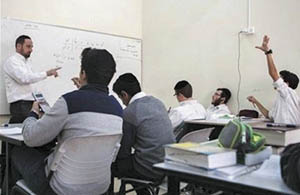
The ultra-Orthodox world is witnessing revolution as more and more haredim join modern workplaces, enlist in the IDF and pursue academic educations, seeking to transcend lives of poverty and isolation • “We want to be involved,” says haredi student.
A quiet revolution is arising inside the insular world of Israel’s ultra-Orthodox Jewish community, chipping away at the walls its leaders have erected to protect against what they see as the dangers of secularism. More and more young ultra-Orthodox are insisting they can continue to lead pious lives while also embracing technology, the modern workplace and their fellow Israelis.
Experts have long warned that Israel faces long-term economic ruin if its fastest-growing sector, the haredim, continues to reject the mainstream education system, enjoy sweeping military draft exemptions, raise large families on taxpayer-funded handouts and devote itself almost entirely to the cloistered world of scripture and study.
The current call for reform, however, is coming from within a community long resistant to outside pressures to change.
Some are leaving ultra-Orthodoxy entirely, with one in 10 moving on to more moderate Judaism or secular life. But others, like Avigdor Rabinovitch, a single, 25-year-old political science student at the Open University, are building a grass-roots movement that strives to transcend a life of poverty and isolation, and to redefine what it means to be an ultra-Orthodox Jew in Israel.
“It’s a new identity that I call ‘Israeli haredim,’” said Rabinovitch, who organizes events for like-minded reformers. “We’re not trying to be like anyone else. We want to be ourselves but to open up to new worlds as well. We want to be involved and not just watch from the side.”
After generations have shunned military service, more young haredim are looking to improve their future job prospects by joining combat and intelligence units that have been set up for them. According to the IDF, some 2,300 enlisted during the last draft year, up from 288 in 2007. Far more are enrolling in higher education as well.
Where only a third of haredi males had jobs as recently as 2003, the employment rate for haredi males has now passed the 50-percent mark, according to Gilad Malach, a researcher from the Israel Democracy Institute who specializes in the community. Haredi women have traditionally been the primary breadwinners, and their employment rates are close to 75%, he said.
“I think it is a historic change,” Malach said. “In the past, in times of crisis, the haredi world would deal with things by closing ranks and tightening the ghetto. But they realize that this just doesn’t work anymore—socially, culturally and financially.”
The haredim—Hebrew for “those who fear God”—make up about 8 percent of Israel’s 8.5 million residents. Many rabbis fear immersion in mainstream society will expose them to secularism and cut into prayer and study. Leaders speak proudly of centuries-old traditions of learning that they believe allowed the Jewish people to survive the Spanish Inquisition, European pogroms, the Holocaust and other catastrophes. Yeshiva study, they say, is no less important than military strength in protecting the country from modern threats and no less valuable than advanced academic degrees.
For decades, a string of secular-led Israeli governments has maintained the status quo, either because of their dependence on ultra-Orthodox political kingmakers or out of fear of an angry backlash from a sector that has not hesitated to block roads, clash with police or send tens of thousands of activists into the streets when ordered by their rabbis. Efforts to force them into the army and workplace have generally failed.
MK Menachem Eliezer Moses (United Torah Judaism), a haredi lawmaker, said that, as individuals, ultra-Orthodox men can appeal to their rabbis for approval for military service, university studies and greater integration. But citing an ancient proverb, he said that as a rule religious study will always take precedence.
“Studying Torah is a goal unto itself,” he said. “You take an 18-year-old boy who has yet to fill himself with knowledge and transfer him to another entity—that is a problem.”
By Israel Hayom Staff/exclusive to JNS.org










